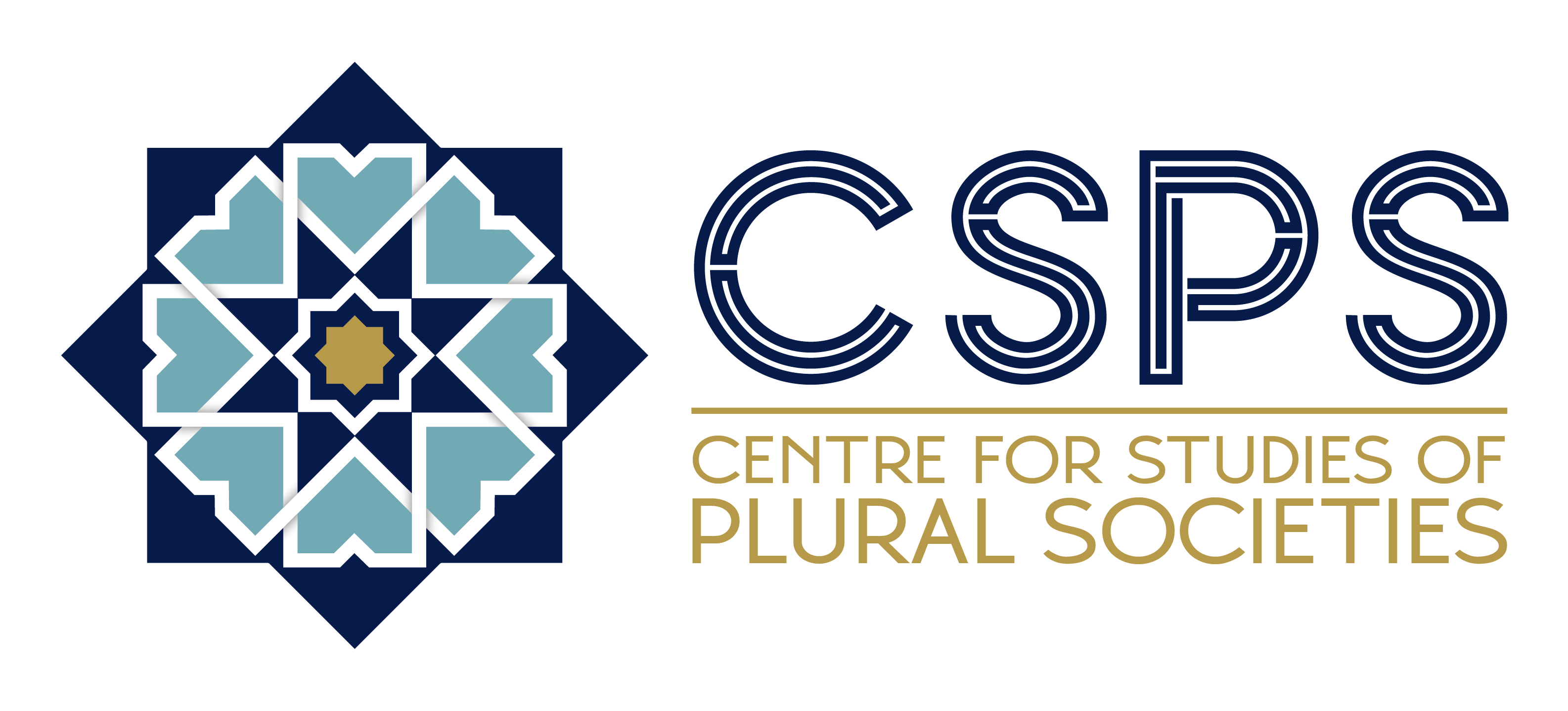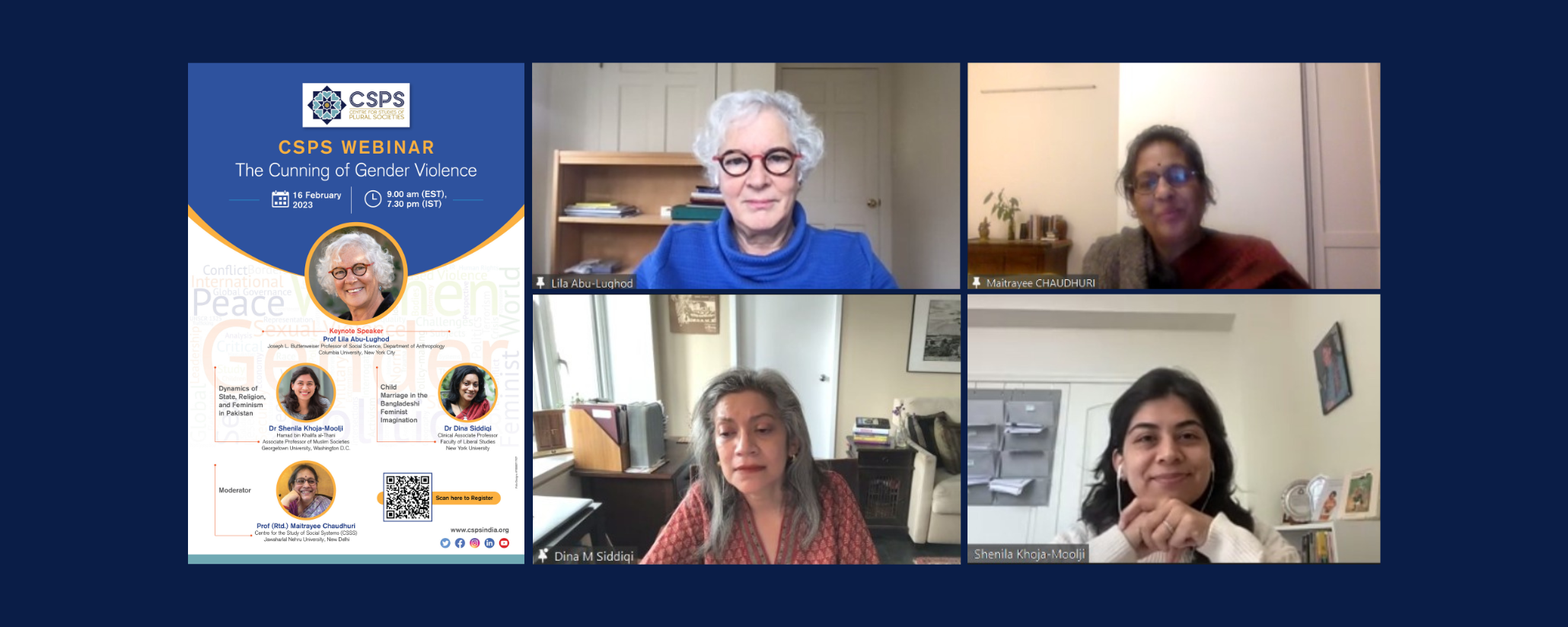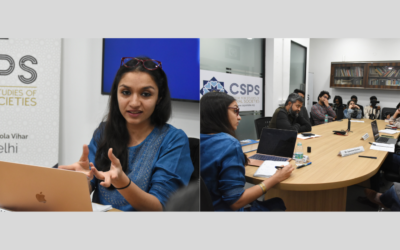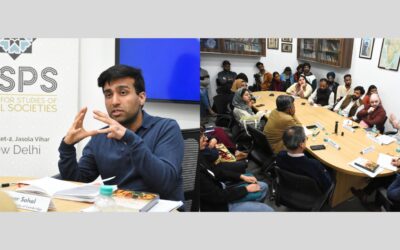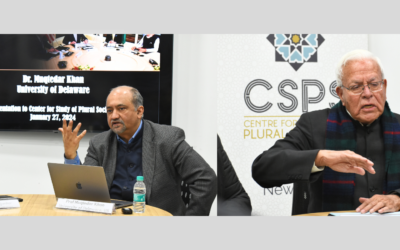Centre for Studies of Plural Societies (CSPS) organised a special webinar on “ The Cunning of Gender Violence.” The keynote speaker for the event was Prof Lila Abu-Lughod, Joseph L. Buttenwieser Professor of Social Science, Department of Anthropology, Columbia University, New York. The co-panellist in the event were Dr Dina Siddiqi (New York University) and Dr Shenila Khoja-Moolji (Georgetown University). The talk was based on Prof. Lughod’s forthcoming edited book The Cunning of Gender Violence: Geopolitics and Feminism, Duke University Press, 2023, with Rema Hammami and Nadera Shalhoub-Kevorkian as coeditors. The event was chaired by Prof Maitrayee Chaudhuri, former chairperson, the Centre for the Study of Social Systems (CSSS), Jawaharlal Nehru University, New Delhi.
About the Webinar:
Prof Maitrayee Chaudhuri in her introductory remarks pointed that the world was marked by the invisibility of gender, as her generation witnessed 50 years ago. However, in the contemporary scenario, the hyper-visibility of gender and its cunning deployment by the different apparatus of power at the global and national levels has created a new hegemonic consensus. Further, to explore the global framing of gender violence. The chair introduced the key speaker Prof Lila Abu-Lughod to highlight the institutionalised debates on gender violence and the exploration of the ‘regional scholars’ in producing the edited volume “The Cunning of Gender Violence.”
Prof Lila Abu-Lughod, in her opening remarks, appreciated the CSPS and its Gender Studies project, while sharing the collective thinking about the book. She underlined that the edited volume is part of a series that will appear in the next wave, shaping the new direction in women studies. She discussed how feminism has seen much success in global institutions, where scholars, practitioners, activists focus on the everyday life of the people in politics. She pointed out how in the 21st century, the international movement collates with the oppressed Muslim Women, which made her write her book Do Muslim Women Need Saving?, generating both interest and controversy. She argues that legitimising violent military agenda in the name of protecting women against violence seems quite exceptional and political. As evident in the case of military occupation in Afghanistan, where Islam evolved as a diagnosis of Gender-Based Violence, and US troops justified its continuous presence.
Extending her argument, Prof Abu-Lughod highlighted an alternative wave where violence brought interdisciplinary collective feminist scholars together with deep region-specific knowledge and critical perspectives on imperial politics. She believed such collaboration has successful implications for feminists to walk in the halls of power in the Global North and has witnessed it for past few decades. She raised denting questions on how does feminist agenda combats Gender-Based Violence, by bringing it to the International Criminal Court, especially in the case of humanitarian intervention in Gaza or Hindu nationalism in India that fueled gender violence. Why are some of the feminist organisations clamouring over intrusion in a campaign to counter violent extremism? Why do some feminist movements turn to the state when the state itself may be a source of violence against women? How the preventive assumption in technologies might be affirming or sustain the dominant rational of power?
While exploring these questions, Prof Lughod, underlined three strategies to rethink: First, the relations between multiple forums and experiences of gender violence. Second, the Hegelian concept of ‘cunning’, or to be productive in capturing a way of well-meaning and even missionaries feminist commitment of the concept. It addresses all forms of gender violence in world affairs. Third, the interconnected circuit of power along which Gender Based Violence Against Women (GBVAW) travels.
Prof Abu-Lughod highlighted how the power of GBVAW is reflected in various chapters of the edited volume, taking up state apparatus and exploring the discourse, where one can distinguish between GBVAW and the apparatus of global governance. Thus, Gender Violence as a political category speaks about the lived reality of violence and hierarchies in gender relations as these intersect with other forms of oppression. Prof Abu-Lughod, in her intellectual exploration, emphasised opening things up by comparing complex relations, context, and specific range of human experience of harm. She recognises the abilities and the ways gender violence is experienced in different countries, which helps them to think about activism in varied forms.
Prof Abu-Lughod discussed four circuits of power identified in the book, to which the institutionalisation of the feminist agenda seems to have attached itself. First, the global security order. Second, states and state institutions themselves perpetuate gender violence but are selectively punished in international legal institutions. Third, civilisational industries describing as intervening in other parts of the world in the name of humanitarian development. And fourth, mass media, whose gatekeeping and representation support these interventions. Therefore, ‘The Cunning of Gender Violence,’ is based on these four circuits, and questions the existing systems, which are responsible for producing and flourishing the conditions for many forms of gender violence. She explained how apparatus formed slow, structured violence legitimate the state violence, even during war and militarism, when the efficacy depends on the attachment of existing form of power that is responsible for big and slow violence.
Prof Abu-Lughod, in her concluding remarks, attempted to go beyond questioning, and reflected on thinking beyond laws, resolutions, and policies. She emphasised the need to look at what GBVAW does, starting with the everyday experience of the subject of violence. She pointed out that clues to think otherwise will always come from close listening to those living in their historically specified situation of violence. She outlined an “Alignment in power” that rests on five C’s: Collaboration, Compromise, Collusion, Complicity and Cooptation, and the need to think and start with the everyday experience of the subject of violence.
Dr Dina Siddiqi, the second speaker and a contributor to the edited volume, in her opening remark, cherished the conversation across regional borders, which is generally unusual, particularly listening and speaking in India, especially when living in the Global North. Her talk focuses on the global development apparatus and how it is implicated in various feminist issues in Bangladesh. She discussed her chapter in the book, where she problematised the categories of child marriage. However, she clarified that neither she was arguing for child marriage nor suggesting a problem in the empirical issues.
She discussed how Bangladeshi feminists have long mobilised against rape, sexual harassment, dowry, related violence, acid throwing, trafficking, and fatwa-driven violence. However, including child marriage in the list appears unremarkable as another patriarchal tradition that needs to be corrected or eliminated. During her discussion, she explored the sacrosanct features of child marriage and social reform in colonial Bengal, where the discussion prominently revolved around upper-caste Hindus, while the Muslim Bengalis were muted. It was only in 2000 that the robust association between child marriage and women’s issues emerged in the national imaginers corresponding to global concerns of marriage, suddenly becoming a global signifier of the world’s child marriage problem. Thus, she raised the question- of why child marriage existed where it does, and why is it so tenaciously attached to feminist and development strategies. What kind of anxiety is child marriage discourse in a particular place? She argued that Bangladeshi cultural anxiety swayed female adolescent sexuality, especially to improvise and financially develop women by bringing them out into the labour market.
Reflecting on Prof Abu-Lughod’s argument, Dr Siddiqi explored the willingness on what are Bangladeshi girls to be saved once they are saved from child marriage. She further argued that the categories of child marriage are seen as a barbaric practice in the way of girl empowerment and national development. It works to obscure the actual capital violence, waking those who work in the labour factory. Thus, factories became the empowerment of freedom.
Further, Dr Siddiqi also emphasised that she is not arguing against jobs for young women. But the image of the girls from the risk of traditions and racialised predatory men veiled within the structural cause of poverty and equality. Moreover, she referred to Mike Murphy’s narrative that discussed all the notions of human capital and discursively proposed embodiment as the site of financial investment. Similarly, the figure of a ‘third world’ girl typically represented as South Asian or African, often Muslim, became the vessel of human capital. She emphasised that from being overlooked traditions, child marriage has surfaced and resurfaced as an object of concern at a critical juncture, corresponding to the financialisation of development.
Dr Siddiqi concluded her presentation with the idea that the discussion on adolescent sexual subjectivity and disguise desired is close privacy on age, at the same time, the will to improve and civilise through the body of development. While child marriage is just the latest category drawn on and reproduced in older civilisational frameworks. She raised several questions, the most significant of her focus on child marriage displaces structural, historical, and political analysis in favour of eliminating backward kinship and cultural expectations. Moreover, certain forms of violence are regularly faced by young Bangladeshi female government factory workers. She emphasised the feminist imagination to take back and rethink the narrative and reframe the thinking that serves girls and adolescents rather than the child marriage did.
The third presenter of the event, Dr Shenila Khoja-Moolji, discussed her chapter contemplating the politics of human rights in Pakistan, particularly in the context of honour killing of Qandeel Baloch, a social media celebrity. She acknowledged that the framework of honour killing and the language of rights in the Geneva conventions have created a space for activists in Pakistan to coherence the state into institutions to measure the protection of women. Such frameworks, as a protector of women’s rights, effectively mask their complicity in creating the right conditions, instead producing women’s subordination.
Dr Khoja-Moolji elaborated on Baloch’s death and highlighted that the news widespread like wildfire. She was a small celebrity; however, her death bought her global fame, as being instantly framed as another victim of honour killing, carried out by the legal impunity in Pakistan. Baloch’s murder pressured the state to pass an amendment that stalled for years. The amendments included harsher punishment for perpetrators, along with the practical loophole, where family members can forgive the perpetrator. She pointed out the successful mobilisation of Civil Society Organisations in the aftermath of Baloch’s killing, signaled not only widespread disapproval of honour crimes in Pakistan but also increased deployment and affinity with the language of rights and the key vocabulary for human dignity, freedom, and equality.
Dr Khoja-Moolji argued that such honour killing cases are trialed under Qisas and Diyat ordinances, which permits the assaulted person or her family to punish the perpetrator in like manner or demand monetary compensation. But the perpetrators are often forgiven by the victim’s family. The activist has been calling to address such loopholes as framed by the state institutions. However, the activist works within the framework of liberal democracy, while the substantial redress can remain in themselves.
Dr Khoja-Moolji emphasised the momentum in activism is notable since 2016. Such activism aimed to amplify the loopholes and compelled Nawaz Sharif to announce his public support for the bill, rejecting any compromise made by the victim’s family in the case of honour killing. It was during Nawaz Sharif’s tenure in 1997 that the Qisas Ordinance was passed in the parliament, where he concealed the interpretative moves to write such laws. Sharif continued to grant the Pakistani state moral authority over women’s life and death. Ultimately, Sharif committed to closing the loopholes and emerged as a benevolent patriarch and an advocate of women’s rights, while the blame was shifted to the backward other.
She argued that to make honour crime a single villain for feminists, it is important to bring attention to the specificities of the violence under consideration along with political and social conditions. Further, she argues how her chapter examines the media performance and narratives about Baloch to provide a thick description of the circumstance that led to her killing. The story became more about political contestations mocking the state and the religious elites publicly. It threatens the normalised specifics of national elites and is influenced by the local media. Furthermore, she pointed out the form of activism that has emerged around Baloch. This form points out these nuanced categories and pressurizes the state to close these loopholes working in the legal realm.
Moreover, using the activist device for constitutional amendments is generally popular in a liberal democracy. While other forms of activism, Dr Khoja-Moolji highlighted, that had emerged over the years is to show presence in the streets and motivate women to take control of public spaces. Such as Baloch’s death mobilises feminist icons adhering to the annual Aurat march, commemorating National Women’s Day. Dr Khoja-Moolji projected some images from the Aurat march reflecting the collaborative efforts of feminist collectives, demanding economic, reproductive, and environmental justice for Pakistani women.
Dr Khoja-Moolji concluded her talk with the image and diversity of feminism activism in Pakistan. She staunchly argues how such activism is drawn from the category of honour crimes and moves beyond its name as multiple intersecting forces that shape women’s lives. Activists’ assertion through a direct protest in public makes the state and religious elite nervous. Moreover, the influence of social media builds feminist solidarity, and instead of seeking state inclusion that relies on the exploitation of sexuality, craved a new dimension of feminist politics.
The session ended!
The chair, Prof Chaudhuri, pointed out that Prof. Abu-Lughod’s presentation highlights a terribly depressing state of affairs. While Dr Khoja-Moolji ended with an optimist visual of the feminist groups in Pakistan to make visible what is happening and the other voices as well. Prof. Chaudhuri summarised Dr Siddiqi’s mention of the matrix used to measure the value, where everything has become institutionalised. Dr Siddiqi is not against child marriage, horror killing, or violence against women, but the problem lies in the structure of the conceptual apparatus, which became normalised, without which we will not be able to do simple writing, researching and observing. It has to be extremely critical in contemporary times because of the existing normalisation of traditional habits.
The session was further followed by a question and answer session.
CSPS Gender Studies Program members Dr Azeema Saleem and Dr Sheeba Naaz delivered vote of thanks and gratitude to the speakers and distinguished participants. More than 150 participants from more than ten countries participated in the webinar, with prominent intellectuals such as Prof Thomas Pogge (Yale University), Prof Elora H Chowdhary (University of Massachusetts), Lisa Vetten (University of Johannesburg), Becca Waxman (California University), Prof Arvinder Ansari (Jamia Millia Islamia), Hem Borker (Jamia Millia Islamia), Dr Omair Anas (Director, CSPS), and Dr Javed Iqbal Wani (Dr B.R. Ambedkar University) attended the session.
About the Speakers:
 Prof Lila Abu-Lughod is a Palestinian-American Anthropologist, whose ethnographic work has been strongly based in Arab World. She is the Joseph L. Buttenweiser Professor of Social Science in the Department of Anthropology at Columbia University, New York City. She has also taught in Williams College, Princeton University, New York University. She has received her PhD from Harvard University (1984) and has been awarded diverse honors; Stirling award (1984), Malcom Kerr Dissertation Prize (1984), Victor Turner Prize (1994), NEH Fellowship (1996), John Simon Guggenheim Fellowship (1997), Carnegie Scholar (2007), American Ethnological Society Book Prize (2008), General Anthology Division Cross Flied Award (2021). She has coined the termed “Securo-feminism,” and published a significant work on, Veiled Sentiments: Honor and Poetry in a Bedouin Society (University of California Press, 1986), Writing Women’s World (University of California Press,1993), Remaking Women (1997), Drama of Nationhood (University of Chicago Press, 2005), Local Context of Islamism in Popular Media (Amsterdam University Press, 2006), Do Muslim Women Need Saving? (Harvard University Press, 2013) and other edited volumes. Prof Abu-Lughod’s upcoming edited volume, The Cunning Gender Violence: Geopolitics and Feminism is published by Duke Publication (Summer, 2023).
Prof Lila Abu-Lughod is a Palestinian-American Anthropologist, whose ethnographic work has been strongly based in Arab World. She is the Joseph L. Buttenweiser Professor of Social Science in the Department of Anthropology at Columbia University, New York City. She has also taught in Williams College, Princeton University, New York University. She has received her PhD from Harvard University (1984) and has been awarded diverse honors; Stirling award (1984), Malcom Kerr Dissertation Prize (1984), Victor Turner Prize (1994), NEH Fellowship (1996), John Simon Guggenheim Fellowship (1997), Carnegie Scholar (2007), American Ethnological Society Book Prize (2008), General Anthology Division Cross Flied Award (2021). She has coined the termed “Securo-feminism,” and published a significant work on, Veiled Sentiments: Honor and Poetry in a Bedouin Society (University of California Press, 1986), Writing Women’s World (University of California Press,1993), Remaking Women (1997), Drama of Nationhood (University of Chicago Press, 2005), Local Context of Islamism in Popular Media (Amsterdam University Press, 2006), Do Muslim Women Need Saving? (Harvard University Press, 2013) and other edited volumes. Prof Abu-Lughod’s upcoming edited volume, The Cunning Gender Violence: Geopolitics and Feminism is published by Duke Publication (Summer, 2023).
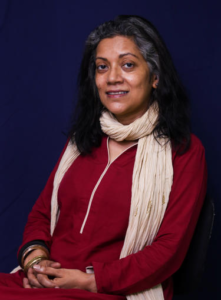
Dr Dina Siddiqi is a member of the New York University Society of Fellows, on the advisory board of Dialectical Anthropology, and on the editorial board of Routledge’s Women in Asia Publication Series. She is on the Executive Committee of the American Institute of Bangladesh Studies (AIBS), and an Advisory Council member of the South Asian Feminist Network- Sangat. She has frequently collaborated with Bangladeshi human rights organizations including Ain o Salish Kendra, Nagorik Uddyog, and Bangladesh Legal and Services Trust (BLAST).
 Dr Shenila Khoja-Moolji researches and writes about the interplay of gender, race, religion, and power in transnational contexts. She authored, Forging the Ideal Educated Girl: The Production of Desirable Subjects in Muslim South Asia and was awarded the 2019 Jackie Kirk Outstanding Book Award from the Comparative and International Education Society, and the 2019 Michael Harrington Award from ‘The Society for the Study of Social Problem’s Poverty, Class, Inequality Division’. Her second book, Sovereign Attachments: Masculinity, Muslimness, and Affective Politics in Pakistan won the 2022 Best Book Award from the International Studies Association’s Theory Section; the 2022 Book Award from the Association for Middle East Women’s Studies; Honorable Mention for the 2022 Lee Ann Fujii Book Award, International Studies Association; and Honorable Mention for the 2022 Best Book Award by the Global Development Studies Section.
Dr Shenila Khoja-Moolji researches and writes about the interplay of gender, race, religion, and power in transnational contexts. She authored, Forging the Ideal Educated Girl: The Production of Desirable Subjects in Muslim South Asia and was awarded the 2019 Jackie Kirk Outstanding Book Award from the Comparative and International Education Society, and the 2019 Michael Harrington Award from ‘The Society for the Study of Social Problem’s Poverty, Class, Inequality Division’. Her second book, Sovereign Attachments: Masculinity, Muslimness, and Affective Politics in Pakistan won the 2022 Best Book Award from the International Studies Association’s Theory Section; the 2022 Book Award from the Association for Middle East Women’s Studies; Honorable Mention for the 2022 Lee Ann Fujii Book Award, International Studies Association; and Honorable Mention for the 2022 Best Book Award by the Global Development Studies Section.
 About the Chair:
About the Chair:
Prof Maitrayee Chaudhuri has retired from the Centre for the Study of Social Systems (CSSS), Jawaharlal Nehru University (JNU), New Delhi. Prof Chaudhuri was the Director of the Women’s Studies Programme (2006-2008) and has been an Advisor of the National Council for Education, Research and Training of India. She was a DAAD Visiting Professor at Albert Ludwig University, Freiburg in Germany (2003), and a Visiting Fellow at Harvard University (1995-1996) as well as at the University of Massachusetts (1995-1996). She was the expert on Asia for “A Feasibility Study of Women, Intangible Heritage and Development” conducted by UNESCO and the Iranian National Commission for Culture in 2001. She was also the coordinator for the JNU Global Studies MA Program in collaboration with the University of Freiburg, Germany, and the University of Natal, South Africa.
The report is prepared by Dr. Azeemah Saleem, Non-Resident Fellow at CSPS
